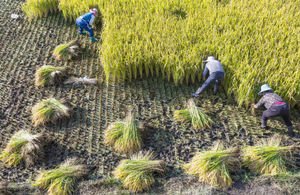

Key Features
Innovate UK and the Biotechnology and Biological Sciences Research Council (BBSRC) are investing up to £8 million (£4 million each) in projects that use cutting-edge technologies to solve agricultural challenges in China.
Programme: Innovate UK and the Biotechnology and Biological Sciences Research Council (BBSRC)
Award: Up to £1.4m
Opens: 5th Jun 2017
Closes: 2nd Aug 2017
The aim of this competition is to encourage innovative partnerships between the UK and China. Innovate UK, BBSRC and the Chinese Ministry of Science and Technology (MoST) are funding this competition as part of the Newton Fund.
Projects should address challenges related to agricultural technologies in one or more of these 3 sectors:
Challenge 1: precision agriculture, agriculture digitisation and decision management tools
The application of precision engineering and technological solutions, with world-leading bioscience research, has the potential to revolutionise farming. This could help to tackle the global challenge of food security. Technological advances in the use of data to inform decision-making and develop predictive tools also offer the opportunity for new approaches to agriculture.
For examples of research and translation under this challenge, click here.
Challenge 2: improving the efficiency of sustainable agricultural production
Many animal and plant pests and pathogens affect Chinese agricultural systems. These have negative impacts on society, the environment and the economy. There is a need for innovative, integrated approaches to the control of pests and diseases. This will support the increasing need to intensify agricultural production while reducing inputs. There is also a need for new knowledge, tools and technologies to help to predict and control emerging threats to agricultural production.
Pests and diseases in crops and farmed animals have developed resistance to drugs and chemical protection products. This is driving the need for new products and approaches to pest and pathogen management. There is also a need to improve the efficiency of agricultural production, by breeding crops and animals with important agronomic traits. Also required is the optimisation of farming practices to improve sustainability.
For examples of research and translation under this challenge, click here
Challenge 3: agricultural products processing
Improving the understanding of quality traits in plants and animals can help to improve nutrition for Chinese consumers. It can also increase the economic value of agricultural products. Other production innovations can improve the quality and safety of agricultural products, and benefit Chinese society and the economy. The increasing availability of data can also help to improve the traceability and quality assurance of produce.
For examples of research and translation under this challenge, click here.
All proposals must
Eligibility
To apply to this competition, your project must contain at least:
You can carry out the project entirely in China, or in China and the UK, but not solely in the UK.
This competition is part of the UK–China Newton Fund.
In the UK, Innovate UK and BBSRC have allocated up to £8 million (£4 million each) to fund projects in this competition. China’s Ministry of Science and Technology (MoST) has allocated up to CNY 60 million to fund projects. Innovate UK and BBSRC will fund the UK project partners and MoST will fund the Chinese project partners.
Total UK project costs of £1 million to £2 million, with grant size not exceeding £1 million in the UK.
Project types
Projects must focus on industrial research.
For industrial research, you could get:
For experimental development work packages, you could get:
